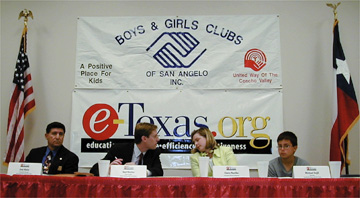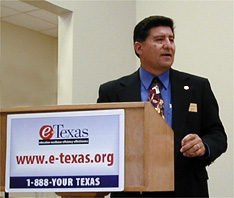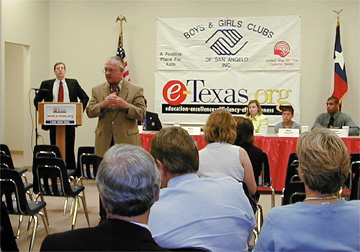| Public Safety & Corrections Task Force
San Angelo, April 25, 2000
Comptroller's Office Hears Public Safety and Correctional Concerns in San Angelo
Close personal relationships between children and adults are essential in curbing juvenile crime in Texas, according to testimony heard at the e-Texas Public Safety and Corrections hearing in San Angelo.
"Juvenile crime is a direct result of a lack of parental and adult supervision," said Claire Noelke, Tom Green County assistant district attorney.

|
|
José Mata, Southside Boys and Girls Club Unit Director; Ned Muñoz, Team Leader; Claire Noelke, Tom Green County Assistant District Attorney; and Michael Bejil, Southside Boys and Girls Club member listen to testimony.
|
The April 25 hearing was one of several public hearings the Comptroller's office is holding in connection with Comptroller Carole Keeton Rylander's e-Texas initiative. E-Texas is a citizen commission charged with developing recommendations to help Texas state government meet the challenges of the Internet Age.
Major Issues
Major issues discussed by panelists and audience members included:
-
Parents need to be involved in the lives of their children to curb juvenile crime,
-
Youth centers and after school programs are a good source of adult supervision and relationship building for juveniles, and
-
Extra-curricular activities encourage students to stay in school, keep their grades up, and learn respect and teamwork.
Panelists' Commentary
Claire Noelke, Tom Green County assistant district attorney, said in her experience, most juvenile crime stems from a lack of supervision. This includes the lack of parental involvement in the child's day-to-day activities. Juveniles get into trouble when they have too much free time and too little adult supervision, she said.
"Youth centers provide a safe place for children," she said. "Children are provided with structured activities and with adults who care about them."
She said youth centers address juvenile crime on several levels.
"First, kids are kept occupied (at youth centers)," Noelke said. "When children are entertained, they are not inclined to engage in criminal activities. Second, adults have, and communicate that they have, high expectations of the children. When this occurs, children will rise to the occasion."
Noelke encouraged Texas to invest in youth centers, such as the Boys and Girls Club of San Angelo where the e-Texas public hearing was being held. Additionally, she recognized the United Way and other non-profit organizations for their commitment to children, and emphasized the need for youth centers and after school programs.
José Mata, executive director of the Boys and Girls Club of San Angelo, spoke about the role of the club in a child's life.
He said the children get a 'club card' which gives them a sense of belonging. He said, the children want and need the supervision of adults and need a safe place they can look forward to attending.

|
|
José Mata, Southside Boys and Girls Club Unit Director speaks to the Task Force.
|
"The Boys and Girls Club provides that safe place," he said.
Additionally, Mata stressed the importance of parental involvement, early intervention, mentors and positive reinforcement in the lives of children.
He also thanked the community for their support of the club and the involvement of community leaders in helping making the club a nicer and better place for the kids.
Michael Bejil attends the Boys and Girls Club of San Angelo regularly and said, "I think that being at the Club will help me stay out of gangs and away from drugs by giving myself an opportunity to learn and grow."
"This is a very positive and educational place to be," he said.
At the Boys and Girls Club, children have the opportunity to build relationships with adults, as well as other juveniles. Activities are provided, including all different athletic activities.
Dominic Reyes, Angelo State All-American linebacker, said sports had a big influence in his life. Not only did football teach him teamwork, it instilled the importance of education.
"Sports helped with education due to the no-pass, no-play law in Texas," he said. "If I wanted to play, I had to make my grades."
That law requires students to pass their academic classes before being able to participate in any extra-curricular activities, whether it is band, drama or athletics.
Reyes said he not only had to keep his grades up, but when travelling with the team, the coaches made the team dress nicely and be respectful. This, he said, taught the team respect and discipline off the field, not just on the field.
Reyes also stressed the importance of saying "no" to drugs. He said not only illegal drugs, but alcohol as well. Everyone should stay away from drugs and alcohol—not just athletes, he said.
"Drugs will keep you from succeeding in all aspects of life, from athletics to drama, from childhood to your adult years," Reyes said.
Public Commentary
Many audience members thanked José Mata for his efforts at the Boys and Girls Club. They also pointed out many other programs that help keep children off the streets and in supervised activities.

|
|
San Angelo Mayor Johnny Fender addressing the
hearing.
|
Discussion arose regarding the low salaries of juvenile probation officers. Most audience members agree that in order to keep good, quality people as juvenile probation officers, the pay needs to be raised.
The overwhelming consensus of the audience and panelists was that children need their parents to be involved in their lives and take responsibility for their child's actions. And when adults take an interest in a child, the child is less apt to enter the juvenile justice system.
| 
